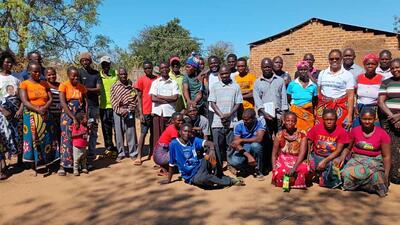

Zambian cotton farmers gain hand-spinning skills, chance at higher incomes
Forty cotton farmers in Zambia – mostly women – have gained the skills to hand-spin cotton, a skill that opens up opportunities for additional income and job creation, in particular for youth.
Farmers in two cotton-growing areas in the district of Mumbwa received the training, organized by the International Trade Centre (ITC), as part of a project funded by the European Union and a project financed by the United Kingdom.
The training was designed to empower women cotton farmers to add value to their cotton by processing cotton into lint, yarn and potentially artisanal products. This will allow farmers to participate in the cotton value chain, earn additional income and take advantage of new job opportunities, particularly for the youth.
One of the trainees, Juliet Kapanga, said that she ‘benefited a lot’ from the training, as she never thought she could add value to the cotton from her field. Another trainee, Ruth Ntombene, said that for a long time, rural women depended entirely on men, but she can now make clothes for her family and also sell some for cash.
The participants (three males and 37 females) received training for two months on how to use a drop spindle before moving on to the spinning wheel. The training and purchasing of equipment was done within the framework of an intra-Africa cooperation agreement with Ethiopia.
The trainees showed high levels of commitment and quickly surpassed the daily standard spinning length of 56 meters of yarn to an average of 78 meters, with several trainees producing between 160 and 180 meters. The trainees graduated as hand-spinners on 3 March 2016, and during the ceremony, the head teacher of Nakasaka School expressed her willingness to introduce weaving as an extracurricular activity for students at the school.
During the training, the Cotton Association of Zambia (CAZ) organized visits for a delegation of donors and government representatives, including the Ministry of Commerce, Trade and Industry, to raise awareness and support for the development of value-added cotton in Zambia.
Previous awareness-raising efforts under EDF10 include an Indian handloom sector study visit in October 2015 for Zambian private and public sector representatives. During the study visit, officials confirmed the government’s commitment to integrating the development of the handloom sector into the national strategy for job creation.
To support these efforts, Zambian farmers will work closely with handloom weavers to produce cotton yarn and supply them to the weavers for production of handwoven products, which will be marketed in Zambia.
This training was organized as part of the ‘Zambian Pilot Handloom Sector Development’ project funded by the European Union under the European Development Fund (EDF) 10 Cotton Programme, which is designed to boost value addition in the African cotton sector, and the ‘Zambia: Empowering women cotton farmers in the cotton sector’, as part of the ITC Women and Trade Programme, funded by the United Kingdom Department for International Development (DFID).















